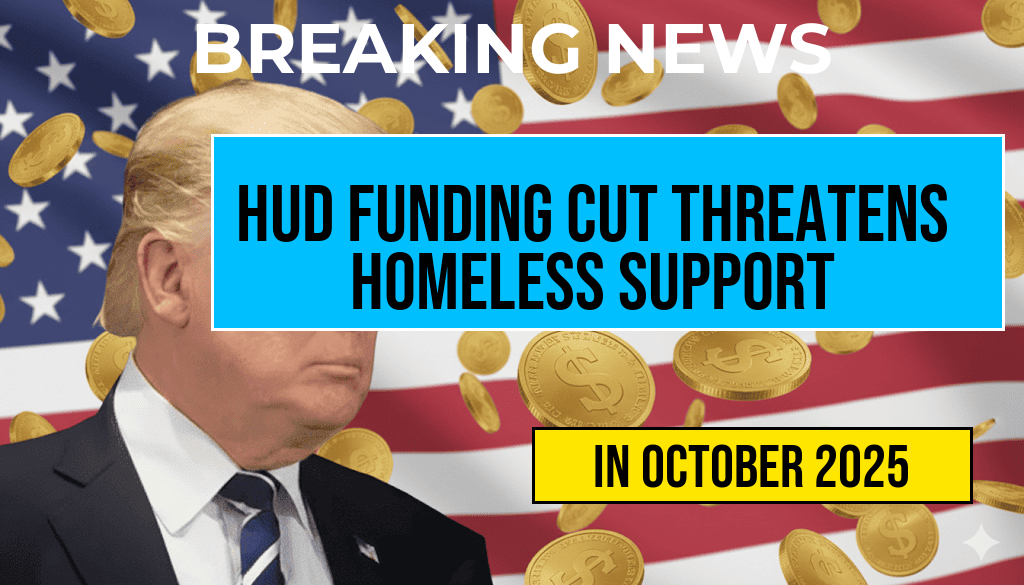Recent legislative proposals to significantly reduce the Department of Housing and Urban Development (HUD) budget threaten to undermine ongoing efforts to combat homelessness across the United States. The proposed cuts could slash HUD funding from approximately $3.3 billion to $1.1 billion, a reduction of nearly 67%. This dramatic decrease jeopardizes vital programs, including those providing housing assistance and supportive services to vulnerable populations. According to industry analysts, the potential loss of approximately $170,000 in funding for local initiatives could have a ripple effect, impairing the ability of cities and nonprofits to maintain critical services. As policymakers debate the future of federal support, advocates warn that such cuts could lead to an uptick in homelessness, straining already overburdened shelters and community resources.
Impact of Funding Reductions on Homelessness Programs
Funding Overview and Proposed Changes
| Program | Current Funding | Proposed Funding |
|---|---|---|
| Housing Choice Vouchers | $20 billion | $8 billion |
| Continuum of Care Program | $2.8 billion | $900 million |
| Emergency Solutions Grants | $2 billion | $700 million |
The proposed budget reduction would significantly cut funding for critical initiatives aimed at providing affordable housing and emergency assistance. The Housing Choice Voucher program, which helps low-income families afford rental homes, would be among the hardest hit, losing nearly 60% of its current funding. Similarly, programs dedicated to preventing homelessness and supporting those experiencing it face substantial reductions, potentially leading to the displacement of thousands of individuals and families.
Local Impact and Community Concerns
Community organizations across the country have voiced concern over the potential consequences of these cuts. In cities like Los Angeles and New York, where homelessness remains a pressing issue, agencies rely heavily on federal funds to sustain their operations. A spokesperson for the National Alliance to End Homelessness warned that a sharp decrease in federal support could result in fewer housing placements, longer shelter stays, and diminished access to supportive services such as mental health counseling and job training.
Financial Risks at the Local Level
While the federal government would see a reduction of approximately $2.2 billion in HUD funding, the impact extends to local governments and nonprofits that depend on these funds to serve their communities. A recent analysis estimates that the shortfall could directly threaten about $170,000 in local program budgets, potentially leading to:
- Fewer available shelter beds
- Reduced outreach to homeless populations
- Postponement or cancellation of affordable housing projects
Such setbacks could reverse progress made over recent years and deepen the cycle of homelessness in vulnerable areas.
Broader Implications and Policy Outlook
Federal Policy Debate
The proposed funding cuts emerge amid broader debates over federal priorities and fiscal responsibility. Supporters of the reduction argue that it aligns with efforts to curb federal spending and promote private sector solutions. Critics, however, contend that scaling back housing assistance will only exacerbate existing social challenges, especially during times of economic uncertainty.
Potential Responses and Alternatives
Several advocacy groups and local officials are urging Congress to reconsider the proposed cuts, emphasizing that investments in housing yield long-term economic and social benefits. They promote strategies such as expanding public-private partnerships and increasing support for innovative housing solutions to bridge funding gaps without jeopardizing essential services.
Resources and Further Reading
- Homelessness in the United States – Wikipedia
- Why Investing in Housing Is Investing in America’s Future – Forbes
As the legislative process unfolds, the fate of federal funding for homelessness programs remains a critical concern for communities nationwide. Ensuring that vulnerable populations do not fall further behind will depend on the decisions made in the coming months and the ability of stakeholders to advocate for sustained support.
Frequently Asked Questions
What is the main concern regarding the recent HUD funding cut?
The primary concern is that the reduction in HUD funding from $3.3 billion to $1.1 billion threatens to significantly impact homelessness prevention efforts and could put approximately $170,000 in funding at risk.
How will the funding cut affect homelessness programs?
The reduction in HUD funding may lead to decreased support services, fewer shelter options, and limited resources for individuals experiencing homelessness, potentially causing an increase in homeless populations.
Why is the $170,000 at risk significant?
The $170,000 in funding at risk is critical because it supports programs that provide housing assistance and support services for vulnerable populations, and losing this money could undermine ongoing efforts to combat homelessness.
What are the potential long-term impacts of the funding reduction?
The long-term impacts may include a rise in homelessness rates, increased strain on emergency shelters, and greater public health and safety challenges resulting from diminished support infrastructure.
Are there any proposed solutions or actions to address this funding crisis?
Stakeholders are calling for legislative action to restore funding, increase public awareness, and explore alternative funding sources to ensure homelessness programs can continue to operate effectively.








